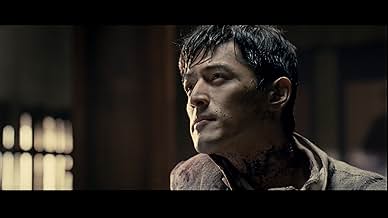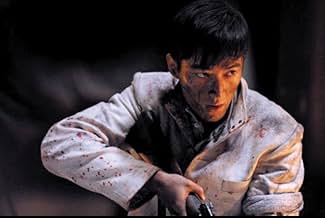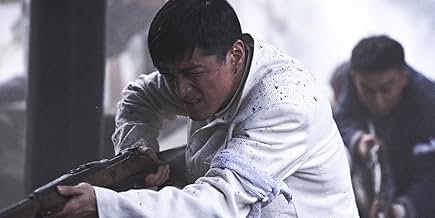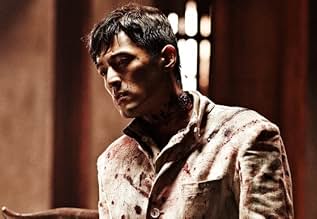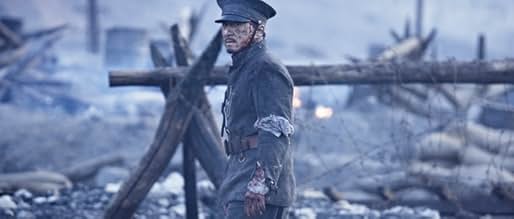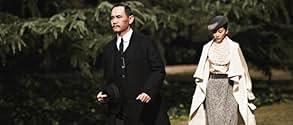NOTE IMDb
5,7/10
6,7 k
MA NOTE
Ajouter une intrigue dans votre langueA historical drama based on the founding of the Republic of China when nationalist forces led by Sun Yat-sen overthrew the Qing Dynasty.A historical drama based on the founding of the Republic of China when nationalist forces led by Sun Yat-sen overthrew the Qing Dynasty.A historical drama based on the founding of the Republic of China when nationalist forces led by Sun Yat-sen overthrew the Qing Dynasty.
- Réalisation
- Scénario
- Casting principal
- Récompenses
- 6 victoires et 7 nominations au total
Bingbing Li
- Xu Zonghan
- (as Bingbing Lee)
Jaycee Cho-Ming Chan
- Zhang Zhenwu
- (as Jaycee Chan)
Yu-Hang To
- Xiong Bingkun
- (as Dennis To)
Duobujie
- Feng Guozhang
- (as Duobuji)
Avis à la une
This film in a word is a mess.
The problem with a lot of historical dramas in general is that their historical scopes are too big to fit neatly into the format of a film. 1911 suffers the same weakness as many other recent "propaganda" movies from mainland China: Irrespective of their propagandistic flairs or contents, they are all trying to cover everything and quickly into a usual 2 hrs duration, a task impossible if not improbable to do well. One has to question how much creative freedom Jackie really had with directing it but even without outside pressure, we can intuit that even Jackie won't want to be liberal with a source material so sensitive and "weighty".
I am not going to delve into the history as you can find better information elsewhere but judging this historical film purely as film, it is unsatisfactory at best. If you want to learn about the 1911 Revolution then perhaps this film would give you a rundown of its historical development; it is mostly centred from the perspective of the revolutionary faction led by Dr. Sun Yat Sen, the founding father of modern nationhood and democracy in China.
As required, you would see plenty of explosions and scenes of war, albeit distributed rather evenly throughout the film, providing as bits of "action" before or after the "civil" and political acts by Sun Yat Sen and the other "players" in the political manoeuvres. The film is littered with bits of textual information supposed to fill you in on the historical facts and significances, but if you are not a fast reader, all of it would fly past your head unless you are a professor in the study of the Revolution. So right off the bat you are witnessing an educational material that lacks substance and depth but only provides you with a general picture and even incomplete at that.
With the typical colour filtering for battle scenes, you are treated with the usual grittiness of war. It is very apparent you are supposed to feel the up welling of emotion as men and women sacrificed their lives for the revolution but if anything, the scenes are so short that before you have the chance/time for up welling, it is over. All we know is that battles were fought, people died, and we move on to the (politic) next part. As a historical book, that is fine, as a movie, it does not work. (Granted some scenes might have been touching but within a film world crammed up with similar attempts at dragging out your inner weak spots, we are emotionally fatigued at best to be moved so easily.)
One would also be appalled at the film's treatment of westerners. They are stereotyped/caricatured and acted awkwardly, seemingly only needed for their appearances and that none of the people hired to act knows how to act. (I mean come on, this is the 21th century, aren't we smart enough now to see through all the old stereotypes and know that people aren't paper cutouts?)
Along with that comes some bad acting on the part of the Chinese casts, where most of them are either wooden or overly melodramatic, some even managed both. Even the Doctor at certain parts of the movie came out awkwardly.
Cinematography. This might be much more centred on my own personal opinion but I find some of the cuts and techniques trying too hard, focusing on style rather than lending itself to the story and the scenes. A lot of potentially good scenes are ruined by fast cuts and awkward transitions which in some cases even provide some hilarious results on a film so centred on seriousness, making it somewhat a deadpan.
I applaud Jackie for taking on directing but maybe perhaps this is not exactly the source material to work with. Personally I find historical films problematic in ways of execution, especially one about politics and dare I say revolutions? There is no way not to read a film like this in propagandistic terms. But then again can there be politic without propaganda? Maybe this one could be read as an irony? The solution to this is: Just don't take on so much, stop making epic political movies all together and give us something much more substantial than the emotionless husks we are always being offered in, dare I say, "sanctioned" art? (But in the case of China, this might be harder than one could imagine.) It is much better to focus on the smaller characters tangled within all these big events, see things from their eyes and get to understand the big picture. The detachment from human emotionality and focusing on the large picture history book-esque is only going to alienate people. For this story, as much as the personage of the doctor is "monumental" and of his endeavours, focus on Sun Yat Sen himself more, his personal struggles, what happens behind doors. Granted this would basically take the film into another direction but political epics just do not work.(At least I haven't seen it work. Western directors already understood the difficulty and infeasibility of trying to cover everything at once. Personally I haven't seen any western films done this way or similarly. If you have seen a successful one, please let me know, I want to learn.)
If a metaphor could be used for this film, then it is akin to watch the scenes outside a fast moving train. Some scenes are nicely shot, well acted, and some sidelined characters having much more commanding presence than the main ones (In this case, I am speaking to the limited screen time roles played by Joan Chen as Empress Dowager Longyu and Chun Sun as Marshal Yuan Shi Kai), but the train is just going too fast for you to take a good look. All this makes you rather be out there...
The problem with a lot of historical dramas in general is that their historical scopes are too big to fit neatly into the format of a film. 1911 suffers the same weakness as many other recent "propaganda" movies from mainland China: Irrespective of their propagandistic flairs or contents, they are all trying to cover everything and quickly into a usual 2 hrs duration, a task impossible if not improbable to do well. One has to question how much creative freedom Jackie really had with directing it but even without outside pressure, we can intuit that even Jackie won't want to be liberal with a source material so sensitive and "weighty".
I am not going to delve into the history as you can find better information elsewhere but judging this historical film purely as film, it is unsatisfactory at best. If you want to learn about the 1911 Revolution then perhaps this film would give you a rundown of its historical development; it is mostly centred from the perspective of the revolutionary faction led by Dr. Sun Yat Sen, the founding father of modern nationhood and democracy in China.
As required, you would see plenty of explosions and scenes of war, albeit distributed rather evenly throughout the film, providing as bits of "action" before or after the "civil" and political acts by Sun Yat Sen and the other "players" in the political manoeuvres. The film is littered with bits of textual information supposed to fill you in on the historical facts and significances, but if you are not a fast reader, all of it would fly past your head unless you are a professor in the study of the Revolution. So right off the bat you are witnessing an educational material that lacks substance and depth but only provides you with a general picture and even incomplete at that.
With the typical colour filtering for battle scenes, you are treated with the usual grittiness of war. It is very apparent you are supposed to feel the up welling of emotion as men and women sacrificed their lives for the revolution but if anything, the scenes are so short that before you have the chance/time for up welling, it is over. All we know is that battles were fought, people died, and we move on to the (politic) next part. As a historical book, that is fine, as a movie, it does not work. (Granted some scenes might have been touching but within a film world crammed up with similar attempts at dragging out your inner weak spots, we are emotionally fatigued at best to be moved so easily.)
One would also be appalled at the film's treatment of westerners. They are stereotyped/caricatured and acted awkwardly, seemingly only needed for their appearances and that none of the people hired to act knows how to act. (I mean come on, this is the 21th century, aren't we smart enough now to see through all the old stereotypes and know that people aren't paper cutouts?)
Along with that comes some bad acting on the part of the Chinese casts, where most of them are either wooden or overly melodramatic, some even managed both. Even the Doctor at certain parts of the movie came out awkwardly.
Cinematography. This might be much more centred on my own personal opinion but I find some of the cuts and techniques trying too hard, focusing on style rather than lending itself to the story and the scenes. A lot of potentially good scenes are ruined by fast cuts and awkward transitions which in some cases even provide some hilarious results on a film so centred on seriousness, making it somewhat a deadpan.
I applaud Jackie for taking on directing but maybe perhaps this is not exactly the source material to work with. Personally I find historical films problematic in ways of execution, especially one about politics and dare I say revolutions? There is no way not to read a film like this in propagandistic terms. But then again can there be politic without propaganda? Maybe this one could be read as an irony? The solution to this is: Just don't take on so much, stop making epic political movies all together and give us something much more substantial than the emotionless husks we are always being offered in, dare I say, "sanctioned" art? (But in the case of China, this might be harder than one could imagine.) It is much better to focus on the smaller characters tangled within all these big events, see things from their eyes and get to understand the big picture. The detachment from human emotionality and focusing on the large picture history book-esque is only going to alienate people. For this story, as much as the personage of the doctor is "monumental" and of his endeavours, focus on Sun Yat Sen himself more, his personal struggles, what happens behind doors. Granted this would basically take the film into another direction but political epics just do not work.(At least I haven't seen it work. Western directors already understood the difficulty and infeasibility of trying to cover everything at once. Personally I haven't seen any western films done this way or similarly. If you have seen a successful one, please let me know, I want to learn.)
If a metaphor could be used for this film, then it is akin to watch the scenes outside a fast moving train. Some scenes are nicely shot, well acted, and some sidelined characters having much more commanding presence than the main ones (In this case, I am speaking to the limited screen time roles played by Joan Chen as Empress Dowager Longyu and Chun Sun as Marshal Yuan Shi Kai), but the train is just going too fast for you to take a good look. All this makes you rather be out there...
Jackie Chan celebrates the milestone of the 100th film in his career with the 100th anniversary of the Xinhai Revolution, significant for ending the reign of the Qing Dynasty and ushering in a new era with the founding of the Republic of China. Simply titled '1911', the expensive historical epic sees Chan taking on the role of General Huang Xing, who was leader Dr Sun Yat-Sen's deputy and commander of the revolutionaries in several cities across South China.
Besides starring in the film, Chan also bankrolled the US$30mil drama and serves as 'general director' alongside TV director Zhang Qi- so let it be known that this is also Jackie's passion project. Nonetheless, good intentions do not a good film make- and '1911' is an excellent case in point. Meticulously researched and assembled to make it as authentic a depiction of history as possible, it is nonetheless underwhelming and lacking in heart, spirit and most of all passion. It is also less a film than a history lesson, and far less compelling than its peers 'Founding of a Republic' and 'Beginning of the Great Revival'.
Yes, it is ostensibly modelled against the latter two similarly big- budget historical pictures that have taken a momentous chapter in China's history and turned it into crowd-pleasing blockbuster entertainment with a who's-who list of actors in roles both large and small. But even with 'Founding's' screenwriters Wang Xingdong and Chen Baoguang, '1911' lacks the finesse of both its genre predecessors, attempting too strenuously to squeeze as many characters and plot lines as possible into its two-hour running time.
We have no qualms with the film's method of introducing its characters with on screen captions, but there are just too many in here to even matter. Indeed, the sheer number of them means that some like Jaycee Chan's Zhang Zhenwu, Yu Shaoqun's Wang Jingwei, or Dennis To's Xiong Bingkun have less than a minute of screen time, and disappear as quickly from their audience's mind. The objective of honouring these martyrs and their respective contributions to the revolution is admirable, but some judiciousness should very well have been exercised to ensure that those given mention do make a difference in the film too.
The consequence of portraying so many characters at once is also that the first half of the film feels extremely haphazard, fast-forwarding from one event to another with little continuity. In fact, this film probably takes the crown for being most heavily reliant on text throughout its duration to explain each and every sequence, and the ill- conceived technique results in a film that feels oddly like watching a history textbook unfold before one's eyes. It doesn't help too that editor Yang Hongyu likes to interrupt scenes just as they are building up with flashbacks or parallel yet unrelated events, effectively preventing the audience from engaging with the characters within.
And even though history is supposed to be an objective and dispassionate exercise, that is no excuse for the lack of any true emotion in the film. Busy juggling the mammoth cast and characters, neither Jackie Chan nor Zhang Qi seem to have paid much attention to the development of the key roles- Huang Xing, Xu Zonghan and even Sun Yat-Sen. Their definition here is essentially one-note- whether the wise intellectual (Sun) or the brave military commander (Huang) or the quiet yet strong-willed wife (Xu)- and you're not likely to feel any differently for any of the characters before and after the film. The only interesting character amongst them all is General Yuan Shikai (Sun Chun), depicted as shrewd and cunning in brokering the abdication of the feudal throne.
In truth, for all its promise of being a gritty war movie a la 'Saving Private Ryan', it is the political struggles in the last days of the Qing dynasty between the provisional president Sun Yat-Sen and Yuan Shikai that proves the most intriguing. Crammed into the last half hour of the film, this particular theme emphasises the challenge of instituting a new political regime which would replace a system more than 2000 years old. In contrast, the battle scenes lack intensity or any genuine thrills for that matter, often drowning in melodramatic music to demonstrate the heroism of the outnumbered and outgunned revolutionary forces against the Qing's military might.
And we suspect that Jackie Chan fans may be most let down by that, since we do expect much better from the veteran actor who's given us some of the most thrilling action movies in the 80s and 90s. Instead, Chan spends most of the time in the film looking old and aggrieved, with only a brief fight between Chan and three men coming close to the old Jackie we've grown to love. What's perhaps even more perplexing is that while Chan gets top billing, his role as Huang Xing is overshadowed by Winston Chao's Sun Yat-Sen and Sun Chun's Yuan Shikai- not simply because both Chao and Chun are better dramatic actors, but also because there is more screen time devoted to both.
Precisely because we are huge fans of the star, it pains us to say that Jackie Chan's 100th movie fails to live up to its expectations as a milestone film in his career or as a tribute to a significant event in modern China's history. Better suited as a TV movie on the History Channel than a lavish blockbuster epic, '1911' could be useful as educational material for those looking for an introduction to the founding of the republic- anyone else will likely be disappointed.
Besides starring in the film, Chan also bankrolled the US$30mil drama and serves as 'general director' alongside TV director Zhang Qi- so let it be known that this is also Jackie's passion project. Nonetheless, good intentions do not a good film make- and '1911' is an excellent case in point. Meticulously researched and assembled to make it as authentic a depiction of history as possible, it is nonetheless underwhelming and lacking in heart, spirit and most of all passion. It is also less a film than a history lesson, and far less compelling than its peers 'Founding of a Republic' and 'Beginning of the Great Revival'.
Yes, it is ostensibly modelled against the latter two similarly big- budget historical pictures that have taken a momentous chapter in China's history and turned it into crowd-pleasing blockbuster entertainment with a who's-who list of actors in roles both large and small. But even with 'Founding's' screenwriters Wang Xingdong and Chen Baoguang, '1911' lacks the finesse of both its genre predecessors, attempting too strenuously to squeeze as many characters and plot lines as possible into its two-hour running time.
We have no qualms with the film's method of introducing its characters with on screen captions, but there are just too many in here to even matter. Indeed, the sheer number of them means that some like Jaycee Chan's Zhang Zhenwu, Yu Shaoqun's Wang Jingwei, or Dennis To's Xiong Bingkun have less than a minute of screen time, and disappear as quickly from their audience's mind. The objective of honouring these martyrs and their respective contributions to the revolution is admirable, but some judiciousness should very well have been exercised to ensure that those given mention do make a difference in the film too.
The consequence of portraying so many characters at once is also that the first half of the film feels extremely haphazard, fast-forwarding from one event to another with little continuity. In fact, this film probably takes the crown for being most heavily reliant on text throughout its duration to explain each and every sequence, and the ill- conceived technique results in a film that feels oddly like watching a history textbook unfold before one's eyes. It doesn't help too that editor Yang Hongyu likes to interrupt scenes just as they are building up with flashbacks or parallel yet unrelated events, effectively preventing the audience from engaging with the characters within.
And even though history is supposed to be an objective and dispassionate exercise, that is no excuse for the lack of any true emotion in the film. Busy juggling the mammoth cast and characters, neither Jackie Chan nor Zhang Qi seem to have paid much attention to the development of the key roles- Huang Xing, Xu Zonghan and even Sun Yat-Sen. Their definition here is essentially one-note- whether the wise intellectual (Sun) or the brave military commander (Huang) or the quiet yet strong-willed wife (Xu)- and you're not likely to feel any differently for any of the characters before and after the film. The only interesting character amongst them all is General Yuan Shikai (Sun Chun), depicted as shrewd and cunning in brokering the abdication of the feudal throne.
In truth, for all its promise of being a gritty war movie a la 'Saving Private Ryan', it is the political struggles in the last days of the Qing dynasty between the provisional president Sun Yat-Sen and Yuan Shikai that proves the most intriguing. Crammed into the last half hour of the film, this particular theme emphasises the challenge of instituting a new political regime which would replace a system more than 2000 years old. In contrast, the battle scenes lack intensity or any genuine thrills for that matter, often drowning in melodramatic music to demonstrate the heroism of the outnumbered and outgunned revolutionary forces against the Qing's military might.
And we suspect that Jackie Chan fans may be most let down by that, since we do expect much better from the veteran actor who's given us some of the most thrilling action movies in the 80s and 90s. Instead, Chan spends most of the time in the film looking old and aggrieved, with only a brief fight between Chan and three men coming close to the old Jackie we've grown to love. What's perhaps even more perplexing is that while Chan gets top billing, his role as Huang Xing is overshadowed by Winston Chao's Sun Yat-Sen and Sun Chun's Yuan Shikai- not simply because both Chao and Chun are better dramatic actors, but also because there is more screen time devoted to both.
Precisely because we are huge fans of the star, it pains us to say that Jackie Chan's 100th movie fails to live up to its expectations as a milestone film in his career or as a tribute to a significant event in modern China's history. Better suited as a TV movie on the History Channel than a lavish blockbuster epic, '1911' could be useful as educational material for those looking for an introduction to the founding of the republic- anyone else will likely be disappointed.
- www.moviexclusive.com
I'm afraid I have to disagree with the other reviewers. I just spent $4.99 renting this film from Time Warner Cable and it was not money well spent. Having been excited by the splendid and creative resurgence of Chinese cinema in the reform period, especially in the 1980s when it burst on the international scene with classics like Yellow Earth (Huang Tudi), it was surprising to see such a throwback to the 1950s and 1960s. This is very much like The Opium War, though the battleship in this film is clearly not a model. In those days (the 1960s), western actors were not available, since China was closed to the outside world, so they had to use some of the few expatriate English language teachers. It looks like they have done the same this time, though surely Jackie Chan could have got anyone he wanted from Hollywood. The characterisation is one- dimensional. The dialogue sounds like it is from the history books, with the film merely providing visual illustration. There are lots of close- ups of Sun Yat-sen taken from below or with him standing in a presidential position, exactly like the shots of Mao Zedong in earlier films about the Communist revolution. This is understandable -- Sun has always been considered the "father of the nation" (guo fu) by both the Communists and the Guomindang, who warred for decades -- but Sun is too interesting a character to be treated to the standard Stalinist "cult of personality" adulation. He was not, after all, a Kim Jong-Il. He was a real politician. He wrote a development plan for China. He planned, but did not live to lead, a Northern Expedition to reunite China under a republican government. The style of the movie seems to be heavily influenced by pre-war Soviet films (not, though, those of the brilliant Eisenstein and Pudovkin). It is surprising that Jackie Chan co-directed it. Surely he could have injected much more of his own cheeky humour? this film is so old-fashioned. I agree it would not have been centenary- reverential to have had fast cuts and rap music, but the slow-motion sentimental flashbacks are so hackneyed. Politically, the film doesn't say anything interesting and blithely ignores the unconscious irony of Sun saying that the Chinese people can now choose their own leaders after two hundred years of monarchy. One hundred years later, they still can't.
Made to coincide with the centenary of the original event, 1911 REVOLUTION is a film that celebrates China's rise from the tyranny of the Qing dynasty into the modern era. It's an unashamedly patriotic movie, with clear-cut heroes and villains, and one that seeks to portray a politically complex situation in a massive country, on an international scale, in the space of two hours. The resultant film is an educational ride and historically interesting, but one that falls down when it comes to the basic facets of movie-making.
The film tries to be both a gutsy war film dominated by explosive battle sequences and a compelling political epic, featuring scenes from both sides involved in the revolution. Unfortunately, the editing is quite choppy and the battle scenes, although technically proficient, end up disappointing as you're left wanting more. Characterisation is virtually nil; Jackie bags the best role as the rebellious leader and has a few great action scenes, but everybody else feels like a player in a historical drama, never really coming to full life as they should. There are lots of familiar Chinese actors in various parts, but none of them make much of an impact here.
It's a shame, because there's a film with a similar focus, set five years previously, called BODYGUARDS & ASSASSINS, and I found it absolutely spellbinding. That movie manages to mix in the political intrigue and dramatic backdrop of the situation while at the same time telling a rollicking, action-packed storyline filled with melodrama and excitement. Yes, it was silly and over the top in places, but I'd rather that than this slightly stuffy and occasionally lifeless production that fails to engage the senses along with the intellect.
The film tries to be both a gutsy war film dominated by explosive battle sequences and a compelling political epic, featuring scenes from both sides involved in the revolution. Unfortunately, the editing is quite choppy and the battle scenes, although technically proficient, end up disappointing as you're left wanting more. Characterisation is virtually nil; Jackie bags the best role as the rebellious leader and has a few great action scenes, but everybody else feels like a player in a historical drama, never really coming to full life as they should. There are lots of familiar Chinese actors in various parts, but none of them make much of an impact here.
It's a shame, because there's a film with a similar focus, set five years previously, called BODYGUARDS & ASSASSINS, and I found it absolutely spellbinding. That movie manages to mix in the political intrigue and dramatic backdrop of the situation while at the same time telling a rollicking, action-packed storyline filled with melodrama and excitement. Yes, it was silly and over the top in places, but I'd rather that than this slightly stuffy and occasionally lifeless production that fails to engage the senses along with the intellect.
Don't get me wrong, I enjoyed certain parts of this film with some superb performances from the main cast. But for the most part it was distinctly average verging on boring, mainly let down by the poor editing (although Singaporean censors may be partly to blame for that) and some laughable acting and scripting, A good example of the latter is the cringeworthy English dialogue for the character of Homer Lea, which is played by (what seems to be) an inexperienced Western actor. Maybe it's the script's fault, but he's the Jar Jar Binks of this production. Fortunately his scenes are very limited in number, but the film could have done without them altogether and be better for it.
All in all, I learned a little Chinese history. I just wish it was more entertaining.
All in all, I learned a little Chinese history. I just wish it was more entertaining.
Le saviez-vous
- AnecdotesJackie Chan's one hundredth movie.
- GaffesWhen the revolutionary leader is on the ocean liner heading for China, the lifeboats on deck are too modern: they are painted bright orange and have built-in engines (note the propellers). The movie is set in 1911, so none of these characteristics would be present. Lifeboats of that era were rowboats, usually painted white.
- Citations
Sun Yat-Sen: The goal of revolution isn't death, but to change fate. Young people are sacrificing themselves for the revolution, so that the living can lead better lives.
- Versions alternativesThe original version has a run time of 121 minutes. The more common release is only 99 minutes long
Meilleurs choix
Connectez-vous pour évaluer et suivre la liste de favoris afin de recevoir des recommandations personnalisées
- How long is 1911?Alimenté par Alexa
Détails
- Date de sortie
- Pays d’origine
- Site officiel
- Langues
- Aussi connu sous le nom de
- 1911
- Sociétés de production
- Voir plus de crédits d'entreprise sur IMDbPro
Box-office
- Budget
- 18 000 000 $US (estimé)
- Montant brut aux États-Unis et au Canada
- 135 739 $US
- Week-end de sortie aux États-Unis et au Canada
- 55 850 $US
- 9 oct. 2011
- Montant brut mondial
- 3 807 134 $US
- Durée1 heure 39 minutes
- Couleur
- Mixage
- Rapport de forme
- 2.35 : 1
Contribuer à cette page
Suggérer une modification ou ajouter du contenu manquant



